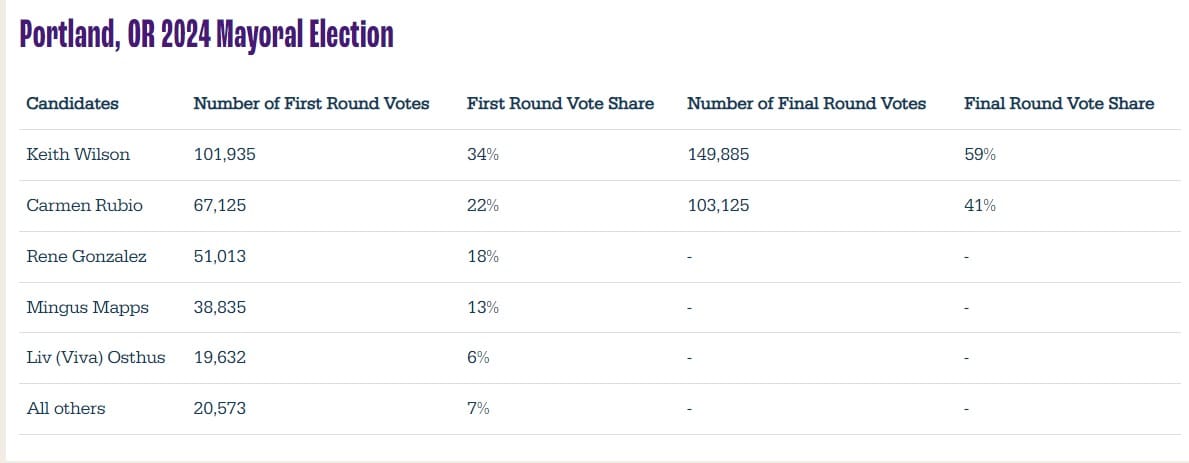More Choice, Better Representation: Portland Voters Use Ranked Choice Voting for First Time

Editor's Note: This piece originally published on FairVote's website. It has been republished on IVN with permission from the organization. Photo by Ben Amstutz on Flickr.
This year, Portland, Oregon used ranked choice voting (RCV) for the first time after voters approved the reform in 2022. Portlanders used RCV to elect all city officials – including a new mayor, and twelve new councilmembers from four 3-member districts using the proportional form of RCV. The reform is already proving its ability to provide better representation and promote effective governance.
Better representation on the Portland City Council
Portland voters elected a historically diverse and gender-balanced City Council. For the first time, Portland’s Council will be half women, and have five members of color, roughly matching the demographics of the city. The council will also have three members who rent their homes, and the councilmember-elects’ ages range from 28 to 70.
As FairVote Senior Fellow David Daley said in a recent reported piece in Salon:
"Fairer rules and fairer representation have changed plenty already [in Portland]. Candidates have been able to laser-focus on their own neighborhoods rather than door-knock across the entire city. And with proportional RCV, there’s a chance for everyone to elect someone to one of their three local seats who represents their views."
Proportional RCV ensures the Portland City Council represents a supermajority (>75%) of voter preferences, not just one group of voters; in other words, at least 75% of voters in each district see at least one candidate ranked on their ballot elected to the council. As a result, the three winners in each district represent a collage of Portlanders’ views. That’s best demonstrated by how most organizations that endorsed candidates saw one or two of their preferred candidates elected in each district.
For example, in District 4, leading candidates Olivia Clark and Eric Zimmerman were endorsed by business group United for Portland, as well as labor groups Working for a Better Portland and the Northwest Oregon Labor Council. The third winner, Mitch Green, received endorsements from a different coalition – including Portland DSA, the Sierra Club, and the Working Families Party of Oregon.
In District 1, which covers historically underrepresented East Portland, the three winners include a business-endorsed candidate and two-labor endorsed candidates, who were a White man and two women of color.
With proportional RCV’s help, the new Portland Council is more representative of Portlanders’ diverse backgrounds and perspectives.
RCV brings better campaigns to Portland
The City Council races were marked by collaborative campaigning and less negative messaging between the frontrunners. As expected in an RCV race, candidates recognized they would benefit from a coalitional style of campaigning – finding areas of compromise with rival candidates, and asking for second-choice support from their rivals’ supporters.
District 3 Councilmembers-elect Angelita Morillo and Tiffany Koyama Lane became known for campaigning around their district with each other and encouraging their supporters to rank them first and second. This strategy seems to have been successful. Additionally, though they hold different views on many issues, Morillo stated at one candidate forum that she looked forward to “bantering” with fellow District 3 Councilmember-elect Steve Novick, who returned the sentiment. At a similar forum for District 2, candidates readily expressed support for other candidates with whom they shared policy positions.
RCV gives outsider mayor a mandate for change
Trucking company CEO and homelessness nonprofit founder Keith Wilson won Portland’s RCV mayoral election. Wilson is a relative outsider to politics who has promised to end unsheltered homelessness in his first year. He likely benefited from homelessness being the highest priority for most voters. His plan stood out from his three strongest opponents – current city commissioners who offered more familiar solutions to homelessness.
Wilson was able to overcome his newcomer status among a crowded field and, because of RCV, he will enter city hall with a clear mandate. Wilson finished with support from 59% of Portland voters after winning 34% of first choices.

Because of RCV, a whopping 84% of voters were able to express their preference between Wilson and his strongest competitor, Carmen Rubio; only 56% of voters picked one of them as their first choice. This represents additional voter power for the 83,950 Portlanders who were able to rank their favorite first, and still have their vote count between the two strongest candidates. Wilson’s political capital will be helpful if he is to win the Council’s support to enact his ambitious plans for the city.
Too wide a field?
Portland had a very wide field of candidates in both the mayoral and Council races. Almost 100 candidates ran for City Council, with 30 each running in Districts 3 and 4; the mayoral race boasted 19 choices. This is likely because Portland was electing a brand-new government, with every seat open – and exacerbated by Portland not requiring any signature collection for candidates to get on the ballot.
Because Portland used RCV, there was no threat of “wasted” votes or “spoiler” candidates. And at least 75% of Portlanders’ first choices went to the top seven candidates in each district, showing that voters were generally able to tell who were the strongest contenders.
Still, having many candidates may create more work for voters, and Portland might consider policy reforms that would allow a field that is wide yet fully manageable for voters. To ensure the most accountability that RCV can provide, we advise some low-level signature threshold for candidate entry.
Portland could also consider changes to its public financing timeline – the candidate withdrawal deadline was the same date that candidates learned whether they qualified for matching funds. With a different timeline, some candidates may have withdrawn after learning they didn’t qualify.
The high number of candidates was not a product of RCV, but rather of Portland’s lack of a signature requirement for declaring candidacy.
Best practices
Following best practices, Portland, Multnomah County, and the candidates themselves ran effective voter education efforts to make sure voters knew about the new system. As Daley noted:
"Simulated RCV ballots have been online on city and county websites so voters can practice and become familiar with the process. The pizza toppings at mayoral forums have been chosen with RCV, as has the gourmet ice cream at other forums provided by the local favorite Jeni’s. Educators have worked to reach people where they are, for example, working with a queer artist collective to combine free headshots for artists with a class on RCV and a performance."
Additionally, preliminary RCV results were released on election night. Oregon is a “mostly by mail” voting state, so further results have been released in the following days as additional ballots postmarked by Election Day were received and tabulated.
The Multnomah County website published easy-to-use election results displays, showing how the RCV count worked in each election. In its first cycle, Portland has already embraced several best practices for implementing RCV.







